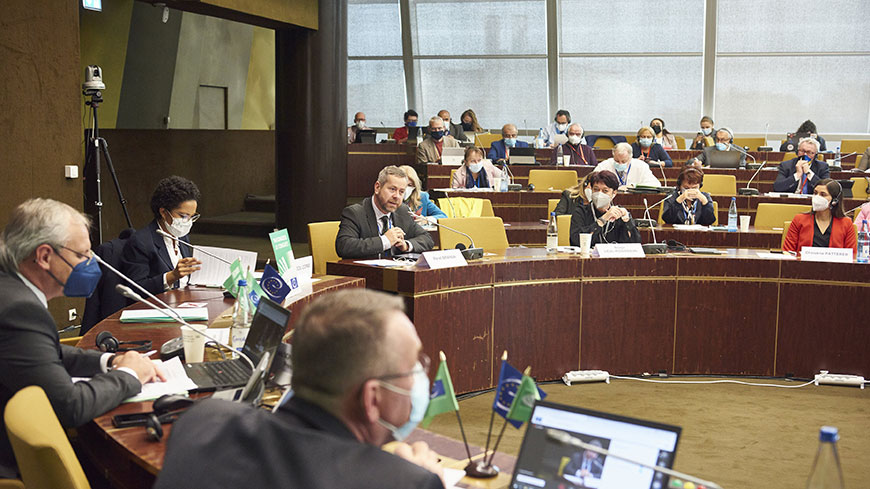The sudden closure of borders between European countries decided in spring 2020, almost unthinkable prior to the Covid-19 pandemic, has had far-reaching consequences in human and economic terms for the inhabitants of border regions, which constitute one in every three European regions. During a debate on inter-regional and cross-border co-operation at the 41st Session on 27 October 2021, the Chamber of Regions of the Congress reiterated the importance of that co-operation and recommended action to reinforce it.
It would be an understatement to say that the closure of borders was a deeply traumatic experience, not only for Europe's citizens but also for its local and regional elected representatives: Pavel Branda (Czech Republic, ECR) who sits both in the Congress and on the EU's Committee of the Regions (CoR), chairing the latter's inter-regional group on cross-border co-operation, presented the resolution adopted on this topic by the CoR. It calls on all the States to consult their local and regional authorities before taking any such measure, while hoping that this issue will never arise again. Mr Branda then reiterated the importance of cross-border co-operation for Europe's future, even if that co-operation had to "grow like a plant, requiring constant attention". Describing the closure of borders as a return to the "bad old days", he saw their reopening as a sign of confidence for co-operation in Europe but believed that it was now necessary to strengthen the legal frameworks governing inter-regional and cross-border co-operation, including by dedicating a permanent structure to that purpose, and implement initiatives to build trust between border populations, which is the basis for successful cooperation.
First vice-president of the Association of European Border Regions (AEBR) and member of Ostrobothnia regional council (Finland), Ann Sofi Backgren presented a few concrete examples of co-operation between Swedish and Finnish border regions. There is now a brand-new ferry running across the Gulf of Bothnia between the cities of Umea and Vasaa for example, representing a wonderful symbol of partnership between the regions and private-sector investors. She sees cross-border co-operation as a "laboratory of the future" capable of meeting the challenges that are to come, particularly in the sphere of the environment.
The speaker of the Tyrol Regional Parliament (Austria), Sonja Ledl-Rossmann presented the joint achievements of her Land and the Italian region of Trentino-Alto Adige, brought together since 2011 in the Euregio Tyrol-Alto Adige-Trentino. They had already carried out 354 joint projects, in areas ranging from agriculture and research to youth and transport. There was a common desire, for the future, to amalgamate their structures for promoting tourism and also to work together more closely on disaster prevention. However, Ms Ledl-Rossmann regretted that there had been cuts in Interreg funding from the European Union, at a time when, on the contrary, more resources were needed to develop cross-border co-operation.
During the debate, several members of the Chamber, Cecilia Dalman Eek (Sweden, SOC/G/PD) among them, emphasised how shocked they had been by the closure of borders. Jan Markink (Netherlands, ILDG), who is the governor of a border province in Germany, reiterated how "nonsensical and needless" this measure had been, even though German hospitals had been able to receive Dutch patients. Josef Frey (Germany, SOC/G/PD) thought that it was now necessary to integrate emergency medical assistance in cross-border co-operation, including by resolving problems that were sometimes of a purely technical nature, such as differences in radio frequencies used by the emergency services of two regions on either side of a border.
Mykola Lukashuk (Ukraine, ILDG) also stressed the growing importance of cross-border co-operation, although the Covid-19 crisis had disrupted many of the programmes run by his region with its Polish and Belarusian neighbours. Now, however, cultural co-operation was resuming and medical co-operation was being set up with Polish border regions, partly for those wounded in the fighting in eastern Ukraine and partly for children. The Estonian youth delegate Susanna Veevo saw cross-border co-operation as crucial because "neither the pandemic nor migrants nor climate change stop at borders". She added: "You cannot speak about Europe to young people if you do not talk to them about climate change".




